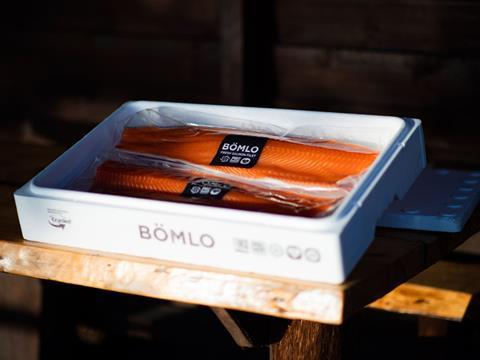
Bremnes Seashore has announced that its BÖMLO salmon fillets will be available in packaging made with BASF’s chemically recycled Styropor Ccycled-based plastic, which it says is identical to conventional boxes made of expandable polystyrene (EPS).
The new packaging is the result of a collaboration between Bremnes Seashore, BASF, and VARTDAL PLAST, a plastics convertor and recycler, to enhance the sustainability of the conventional EPS fish box.
Simon Nesse Økland, head of development at Bremnes Seashore, explains: “The EPS Fish Box is a well-known and trusted companion of ours with excellent properties for maintaining and securing the cold chain during transport. A secure cold chain is vital for food safety and preventing food waste.”
BASF claims that its Styropor Ccylced has the same properties as conventional Styropor, which will maintain important properties such as thermal insulation and pressure-resistance with good buckling stiffness and stacking stability – reportedly essential for keeping fish cool and fresh.
Using BASF’s chemical recycling process, pyrolysis oil – sourced from the thermochemical process of pyrolysis, which converts post-consumer plastic waste that would otherwise be used for energy recovery or go to landfill into a secondary raw material – is used as a replacement for fossil-based materials.
BASF adds that the pyrolysis oil is mixed with fossil raw materials during production, with the recycled portion of Styropor Ccycled allocated using a Mass-Balance approach. The allocation process and product itself have apparently been certified by an independent auditor, while a life cycle assessment suggests that Styropor Ccycled saves at least 50% of CO2 in production compared to conventional Styropor.
According to BASF, Styropor Ccycled creates virgin quality plastic and is food contact approved.
Klaus Ries, head of BASF’s styrenics business in Europe, comments: “Chemical recycling of plastic waste is not only an essential building block to achieve the European circular economy targets but is especially useful for applications with high requirements for the quality and safety of the material such as protective packaging, pharma boxes and food packaging.”
Circularity and recycling innovations are increasingly important for the styrenics value chain, as it seeks to meet EU targets for recycled content.
The plastics convertor, VARTDAL PLAST, uses the Styropor Ccycled to create the EPS fish box, which is reportedly certified according to the ecoloop certification programme as containing 100% recycled feedstock.
Jan Endre Vartdal, owner and CEO at VARTDAL PLAST, says: “Our goal is to transform our entire production from using fossil based raw materials into using fossil free or recycled raw materials.
“The use of Styropor Ccycled raw material from BASF enables us to begin this transformation in close cooperation with our customers without compromising on quality and recyclability.”
The companies add that EPS fish boxes are currently recyclable and recycled widely in Scandinavia, the main market for Bremnes Seashore. Fish boxes are collected, compacted and shredded, then used as feedstock to produce recycled polystyrene for various applications such as insulation boards, according to the companies.
Vartdal adds: “As a plastic producer we have a responsibility to contribute to getting our products back into the loop.
“For this reason, we have set up two high-capacity compacting sites in the middle of Norway and in the eastern part of Norway.
“By utilizing return freight, our own trucks collect and transport EPS from waste disposal sites, fish processors and building and construction hubs back to our compacting sites, where the EPS is shredded, compacted and palleted ready for recycling.
“Our long-term goal is to source the compacted material back into our product series VARTDAL LOOP which only consists of products made from recycled or fossil free raw materials.”
The new EPS fish boxes for Bremnes Seashore’s BÖMLO salmon fillets will be available from Christmas 2021 in Norway.












